- Home
- Mike Lupica
Heavy Hitters Page 2
Heavy Hitters Read online
Page 2
“I’m not gonna rub, period,” Ben said.
He got up then.
He heard the applause from the bleachers, gave a quick look over there, to where his mom was standing with Lily. His arm still stung — a lot — but Ben raised it, giving them a quick wave, letting them know he was all right as he started walking up the first-base line.
Robbie Burnett walked alongside him.
“Dude,” he said, “I am so sorry. If there was some way to go back and un-throw that pitch, I would.”
Ben put out his fist — right fist — so Robbie could bump it and said, “Hey, I’m just glad that’s all the fastball you’ve got.”
Robbie walked back to the mound. When Ben was standing on the bag at first base his dad asked him again if he was all right and Ben said, “I’m fine, Dad, unless I need to do something left-handed on my way around the bases.”
He rolled his sleeve back down so he wasn’t tempted to look at the seams. Ben thinking he was going to feel a whole lot better once he scored the tying run before Darrelle or Sam scored the winning run.
Now Jeff McBain told Ben the stuff he’d been telling him all game long when he got to first base, about running hard on a ground ball, playing it halfway on a fly ball, being ready if Mr. Brown gave him the steal sign. Told him to pick up Mr. Brown as he came around second if Darrelle got a base hit to right. Told him not to take any chances on a single to left, even if the ball was in front of him.
“Can’t make the first out of the inning at third,” his dad said.
“Duh,” Ben said.
Robbie was pitching from the stretch, keeping Ben close, not wanting him to steal. But he seemed so preoccupied with Ben that he walked Darrelle on four pitches.
First and second, nobody out, Sam up.
Sam’s dad made Sam take a pitch, had to, Robbie still hadn’t thrown a strike. But now he poured in strike one. Missed high with the next pitch. One and one. The third pitch was a fastball on the inside part of the base, but you couldn’t beat Sam inside, his bat was too quick, he lined a ball hard between short and third, Ben having to slow down to make sure the ball didn’t hit him. Thought about trying to score, but saw Mr. Brown holding him up, Ben turning to see how close to the infield their left fielder had picked up the ball.
It was the right play. Still nobody out. Justin coming to the plate.
Ben’s arm wasn’t hurting as much now. He knew it was this kind of moment making him feel better, the baseball fan in him loving this. Their power hitter against the other team’s power pitcher, strength on strength, game on the line.
“On the ground, you gotta bust it home,” Mr. Brown said.
Ben nodded, thinking that a ball on the ground would be some sort of major upset now, with Justin’s smooth uppercut swing. Worst case, as long as Justin didn’t strike out again? A sac fly to tie the game.
Best case?
A walk-off grand slam to start the season.
Ben watched Mr. Brown run through his signals, touching his cap first, telling Justin to swing away at the first good pitch he saw.
But Justin didn’t do that, took a fastball right down the middle, watching the ball slap into the catcher’s mitt. Shook his head, asked for time, like he had to regroup after taking a pitch that good. Adjusted his batting gloves, got back in. Took his stance.
Swung at the next pitch, one up in his eyes, missing it by a foot.
0-2.
“Just takes one, Jus,” Ben calling out from third, forgetting about his arm in the moment, clapping his hands, just doing that sending a jolt up his arm.
The next pitch was as good as strike one had been. What Coop liked to call a “crush-me fastball.” Waist high. Right down Main Street.
Justin didn’t miss this one. But he didn’t do much with it, either. Barely got a piece of it, hitting a one-hopper right back to Robbie. Ben wasn’t even halfway to the plate when Robbie threw to the catcher for the force, the catcher then firing the ball to first to double up Justin Bard.
Two outs, just like that. Ben knew: You didn’t see a lot of double plays at their age level, and you hardly ever saw one as easy as that, Darrelle on third now, Sam on second. Still a chance to win if Shawn could get a hit.
Shawn jumped on a 1-1 pitch, hitting a shot high to left-center, everybody on the bench jumping up as they watched the flight of the ball, Coop yelling “Get out!” from the on-deck circle, all of them thinking — hoping — that Shawn had gotten all of it.
Shawn knew better.
He’d tell them that he knew he’d just missed it, knew he’d just caught it an inch too close to the end of his fancy new Easton bat, watched along with everybody else as Parkerville’s center fielder ran the ball down six feet short of the fence.
Ball game.
Ben stood in front of the Rams’ bench, watched the center fielder sprint toward the infield, toward the crowd around Robbie behind the pitcher’s mound, holding the ball high over his head like it was some kind of trophy.
Lot of firsts tonight, he thought as he went to get the ice pack in Mr. Brown’s first aid kit.
First game, first loss.
First time he’d ever been hit by a pitch in his life.
Mr. Brown did the same thing he did after every practice and every game, had the whole team go sit in a circle around him in the outfield grass behind first base.
When the players settled in around him tonight, he said, “Well, an awful lot happened in that last inning, didn’t it?”
“None of it good,” Coop said. “I’m just sayin’.”
“And I’m saying you’re wrong, Coop,” Mr. Brown said.
Sam made a gasping sound and said, “Impossible!”
The guys laughed. So did Sam’s dad.
“Seriously,” his dad said. “We loaded the bases against one of the hardest throwers in the league and had our cleanup guy at the plate. I’ll take that exact same situation in every single game we play the rest of the season. Robbie just made a great pitch on Justin, is all. That’s just baseball. I know you guys hear this from me all the time. But the other team wants to win, too.”
Ben sat there between Sam and Coop, holding the ice to the inside of his arm, knowing Mr. Brown was right. Two teams, one winner, that’s the way it always worked, no crying about it afterward, like the guy said in that movie about women playing baseball, A League of Their Own, no crying in baseball.
And this wasn’t football, or even basketball, you didn’t have to wait a week to play your next game, they had Darby coming on, right here at Highland Park, a few nights later.
From behind him he heard Justin say, “You can try to make me feel better all you want. But I would have been better off getting hit the way Ben did, we would’ve won the game.”
Ben turned around, grinning, offered him the ice pack, and said, “Okay, you need to put this on your head.”
“I’m not kidding.”
“No,” Ben said. “You’re crazy. If we played them again right now, I’d still want you up there in that situation.”
In a voice way too small for a guy as big as Justin, he said, “I know you’re trying to be a good teammate, McBain. It’s what you do. But everybody sitting here knows I cost us the game.”
Ben noticed now how red his eyes were, afraid in that moment that there might be some crying in baseball, from Justin. A guy who was usually as happy and upbeat on a baseball field as Cooper Manley was.
Before anybody on the Rams could say anything else Justin said, “Coach, can I leave a little early today? My mom’s here.”
Usually Justin’s mom and dad both came to games, Justin’s dad had been a big baseball star at the University of Connecticut when he was young, had been drafted by the Orioles, but never made it out of the minor leagues before he started his own company. Ben had asked Justin one time what kind of company his dad owned and he said, “The kind that buys up other companies.”
“Go ahead, big man,” Mr. Brown said. “Just remember: We had our chances
all night long to score more runs and didn’t. It’s never just one player who loses a game.”
“Tonight it was,” Justin said, got up, walked slowly toward the parking lot, bat over his shoulder, first baseman’s mitt in his hand. Head down. Like they’d lost the last game of the season and not the first.
Mr. Brown watched him go and when Justin was out of earshot he said, “That’s just one more guy on our team who wants to win in the worst way. See you all at practice tomorrow.”
When they were all up Mr. Brown said to Ben, “How you feeling?”
Ben said, “Better than Justin.”
They had snacks even after night games, Darrelle’s mother having brought bottles of Gatorade and water, bags of chips, and her own homemade chocolate-chip cookies. Ben, Sam, Coop, and Shawn got their cookies and drinks and went and sat in the bleachers.
“Justin wouldn’t feel nearly as lousy if I’d done my job,” Shawn said.
“But that’s the thing,” Ben said, “you did do your job: You hit the snot out of the ball. Guy just ran it down this time.”
Coop said to Ben, “Take the ice off for a second so I can see your arm. Sam said you could see the seams of the ball.”
Ben showed him. “Wow,” Coop said. “I can almost see ‘Rawlings,’ too.”
“Thanks for sharing,” Ben said.
“No, listen, I think it’s cool,” Coop said. “Like a badge of honor.” His face brightened, the way it did when what he considered a brilliant thought came to him. “What’s that book we had to read that I had so much trouble getting through?”
“I’m afraid you’ll have to be a little more specific,” Sam said.
Ben knew. “The Red Badge of Courage,” he said.
“Exactly!” Coop said. He pointed at Ben’s arm now, if not red then certainly pink from the ice and the seams. “Red Badge of Courage McBain!”
But Ben didn’t feel brave.
Just tired and sore and ready to go home. Mr. Brown was right. A lot had happened in that last inning. And Coop had been right, too. None of it good, whether they’d loaded the bases or not.
Ben always went back to a line his dad liked to use, one that the old football coach Bill Parcells had said one time:
In the end, nobody remembered why you lost.
Just that you lost.
* * *
Ben was up in his room, on his bed, watching the Yankees play an interleague game against the San Francisco Giants on his laptop, his dad once again having purchased a season ticket on MLB.TV so both he and Ben could watch any game they wanted to on their laptops. There weren’t all that many shortstops right now that he wanted to watch, but he still liked watching Derek Jeter, even though Jeter was old. And he loved watching Brandon Crawford of the Giants, who could not only catch everything, but had one of the strongest arms on an infielder Ben had ever seen.
There was a knock on his door, his dad poked his head in.
“No more ice?” Jeff McBain said.
“My arm was starting to feel like a Popsicle without a stick.”
His dad sat down on the end of the bed.
“That was not a boring game,” he said.
“You think?” Ben said.
“I can’t ever remember you getting hit before.”
“I never did. I still can’t believe I couldn’t get out of the way.”
His dad pointed at Ben’s laptop. “Happens to those guys all the time.”
“The pitchers are throwing ninety,” Ben said. “Or more.”
“Robbie was a lot closer than they are in the big leagues,” his dad said. “And as hard as he throws, it probably looked like it was coming at you a hundred miles an hour.”
Ben grinned. “Dad,” he said, “I’m good, I really am. I’ve been hit way harder in football than that ball hit me tonight.”
He muted the sound on the game. Sometimes he could just tell when his dad was settled in, wanted to talk. This was one of those times.
“I know you’re good,” Jeff McBain said.
“You want to know something funny? Right before our first practice, I was saying to the guys that all I wanted was for nothing bad to happen this season. Like Sam getting hurt in basketball because I made him stay out and practice with me that night.”
There was a small park right next to their house that Ben and his friends called McBain Field. There was enough room for them to play touch football, a basketball halfcourt at the far end, next to one swing set. Ben had played a lot of ball out there in his life, so had the rest of the Core Four, even before Shawn came along. But it wasn’t the best court, and Sam had stepped in a hole and missed the rest of the season, except for that last game against Darby.
Ben still blamed himself.
“The good news is that it wasn’t all that bad,” his dad said.
“Easy for you to say,” Ben said, smiling at his dad. “That thing felt like a rock.”
“Tell me about it! I took one off my knee one year when I was about your age and that knee was still sore when football started up.”
“You never told me about that.”
“Not one of my choicer sports memories,” his dad said. “I prefer the ones that don’t hurt.”
“I’ll be ready for practice tomorrow.”
“Let’s at least wait and see how it feels when you wake up in the morning.”
“You want me to high-five you, show you it’s better already?”
“I already know how tough you are, big boy.”
His dad got up, kissed him on the top of the head, closed the door behind him as he left. Ben went back to his game. Jeter batting against Tim Lincecum. Jeter holding out his right hand to the home plate ump, his way of saying he wasn’t quite ready to hit. Taking his stance. His bat held high. Ready now. Lincecum went into his windup, came inside with a fastball. Way inside. Jeter didn’t bail out, didn’t even move his feet or leave the batter’s box, just threw his butt and his hips back even though the ball nearly grazed his belt buckle.
According to the little box in the top corner of the screen, the pitch had come in at ninety-four miles an hour.
Jeter showed the ball no respect, no fear.
No other way to be.
Ben knew you couldn’t be afraid and hit a baseball, he had seen plenty of guys in Little League whose knees started to buckle as soon as the ball left the pitcher’s hand. Or who didn’t step toward the pitcher with their front foot, instead stepped into what was known as the “bucket,” stepped toward third base if they were a right-handed hitter or first if they hit lefty.
On the laptop screen, Jeter went into his routine again, took his stance, lined the next pitch he saw from Lincecum right back up the middle so hard it was like he was trying to cut Lincecum’s hair with the ball.
Out of curiosity, Ben went to a Derek Jeter stats page on the Internet and found he had been hit by pitches more than 160 times in his career.
It was part of the game, even for the most famous players in the world. How had Coop put it on the way home tonight? He had called it the “price of doing business.”
Ben watched the rest of the inning, shut off his laptop. Shut the lights. Enough baseball for one night.
Closed his eyes and wondered what it was like for the great Derek Jeter the first time he couldn’t get out of the way.
The next day his arm still hurt enough when Ben tried to grip a bat that both Mr. Brown and his dad decided to have him skip batting practice.
“We’ll give it one more day,” Mr. Brown said. “One thing about you, you’re not going to forget how to hit.”
“Plus,” Ben said, “now I’ve discovered how to get hit.”
“Well,” his dad said, “I don’t think you actually discovered it.”
Ben had wanted to take some cuts today, just to get back at it, see how he did the day after, standing in there against Mr. Brown, who loved to pitch BP to them. And who could really throw. And who gave them no breaks on the way he came at them. The only thing he’
d do, just to make it more of a fair fight, was stand about ten feet behind the pitcher’s mound. But then he’d throw as hard as he could, his theory being simple enough: If you could get around on his fastball, you could do that with any eleven- or twelve-year-old fastball in the Butler County League.
But on this day, Ben’s batting practice consisted of standing out at shortstop — for some reason the ball landing in the pocket of his glove didn’t bother him — or making his way around the bases while the other guys hit, some of them trash-talking Mr. Brown, Coop nailing one over Shawn’s head in the outfield one time and asking if Mr. Brown’s arm was bothering him.
Mr. Brown yelled back at him, “Now remember, Coop, if the ball manages to slip and you get buzzed, it’s considered bad form to rush the pitcher’s mound when your coach is doing the pitching.”
Coop said, “I thought you taught us to not only rush the mound, but bring our bat with us.”
“Joking,” Mr. Brown said.
“Oh,” Darrelle said from the on-deck circle, “you mean I wasn’t supposed to tell my mom you said that?”
All of them having fun today.
All except Justin. From the time he’d gotten to Highland Park, he acted as if last night’s game had just ended, as if he’d just hit into that double play. When it was his turn in the box, he acted as if he wanted to hit every pitch he was seeing from Mr. Brown out of Rockwell, and maybe halfway to the moon.
He finally connected a couple of times, nothing over the fence, coming close one time before Sam made an over-the-shoulder catch in center. But the rest of the time it was weak pop-ups, two slow rollers to Ben at short, and a bunch of pitches he missed by a foot.
Like he was the one who had forgotten how to hit.
When practice was over and they were sitting in the outfield grass, Mr. Brown talked mostly about the Darby game on Friday night.
“I’ve got this crazy feeling,” Mr. Brown said, “that we don’t want to fall to oh-and-two, and we certainly don’t want to do that against the Darby Bears.”
“I’d rather go to summer school than lose to Darby,” Coop said.
“Wow,” Darrelle said.

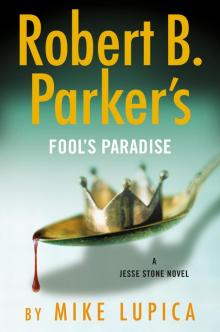 Fool's Paradise
Fool's Paradise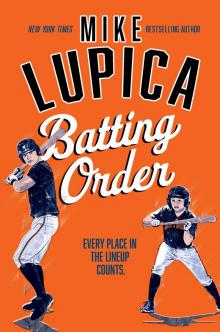 Batting Order
Batting Order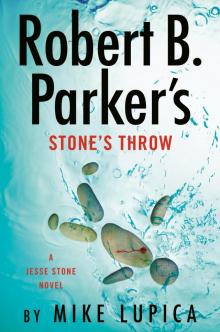 Stone's Throw
Stone's Throw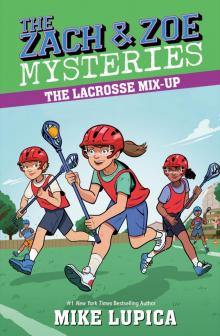 The Lacrosse Mix-Up
The Lacrosse Mix-Up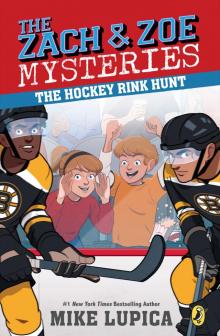 The Hockey Rink Hunt
The Hockey Rink Hunt Payback
Payback Triple Threat
Triple Threat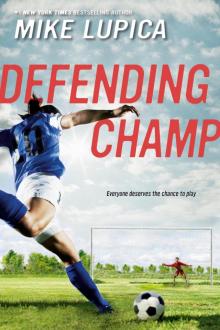 Defending Champ
Defending Champ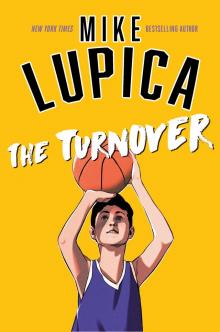 The Turnover
The Turnover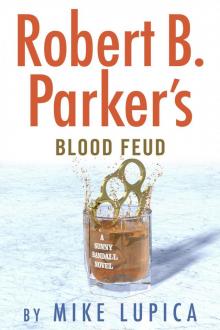 Robert B. Parker's Blood Feud
Robert B. Parker's Blood Feud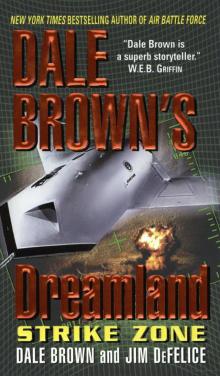 Strike Zone
Strike Zone Hero
Hero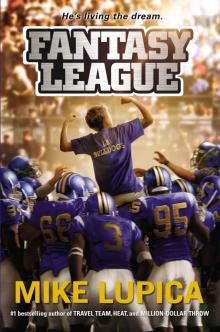 Fantasy League
Fantasy League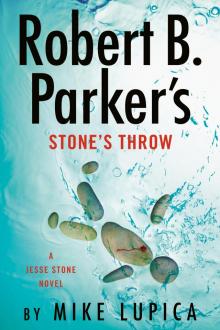 Robert B. Parker's Stone's Throw
Robert B. Parker's Stone's Throw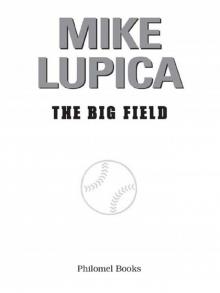 The Big Field
The Big Field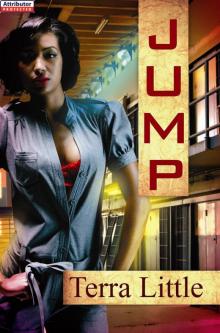 Jump
Jump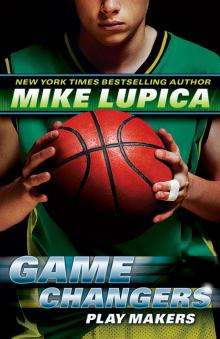 Play Makers
Play Makers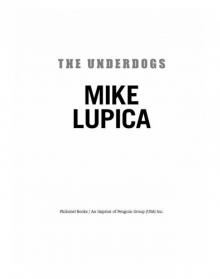 The Underdogs
The Underdogs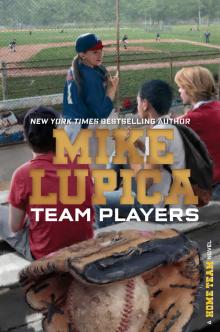 Team Players
Team Players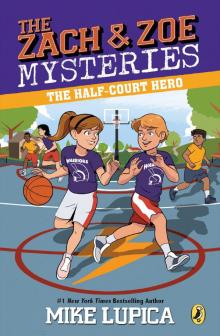 The Half-Court Hero
The Half-Court Hero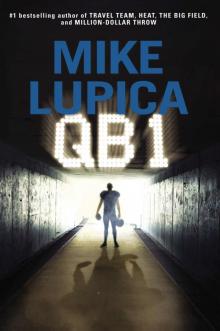 QB 1
QB 1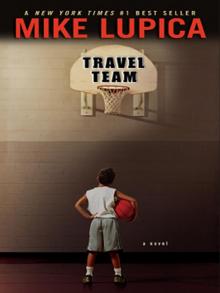 Travel Team
Travel Team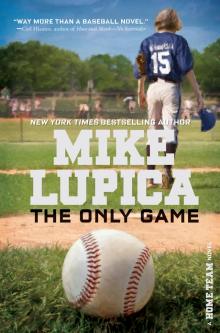 The Only Game
The Only Game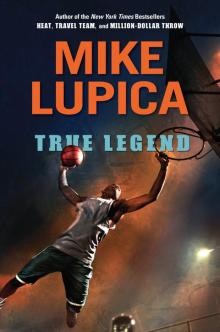 True Legend
True Legend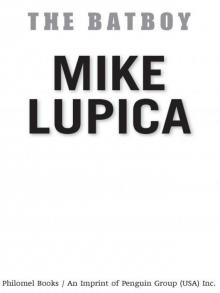 The Batboy
The Batboy Hot Hand
Hot Hand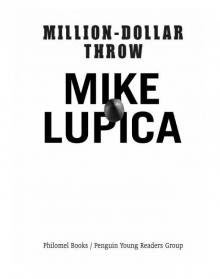 Million-Dollar Throw
Million-Dollar Throw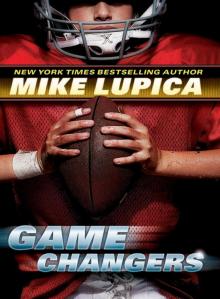 Game Changers
Game Changers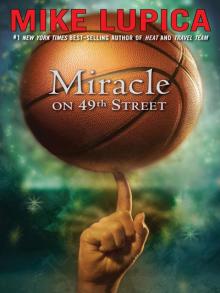 Miracle on 49th Street
Miracle on 49th Street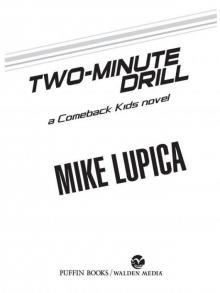 Two-Minute Drill
Two-Minute Drill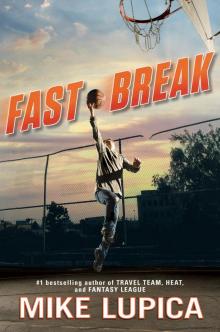 Fast Break
Fast Break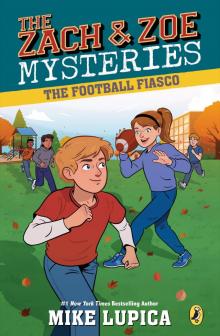 The Football Fiasco
The Football Fiasco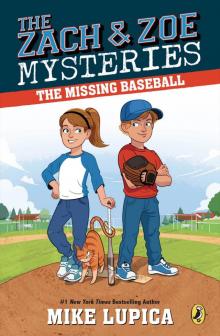 The Missing Baseball
The Missing Baseball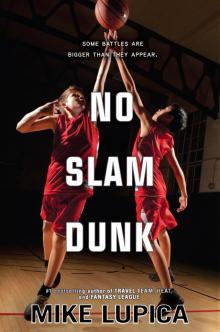 No Slam Dunk
No Slam Dunk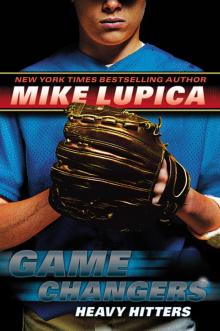 Heavy Hitters
Heavy Hitters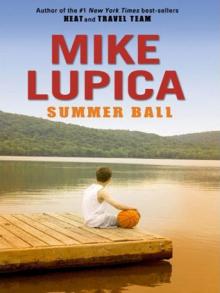 Summer Ball
Summer Ball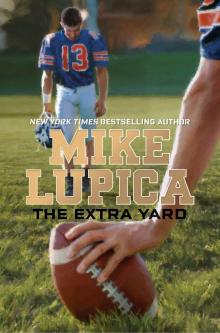 The Extra Yard
The Extra Yard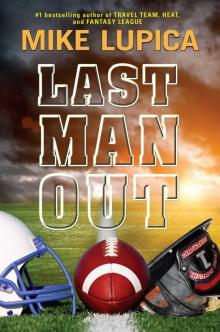 Last Man Out
Last Man Out